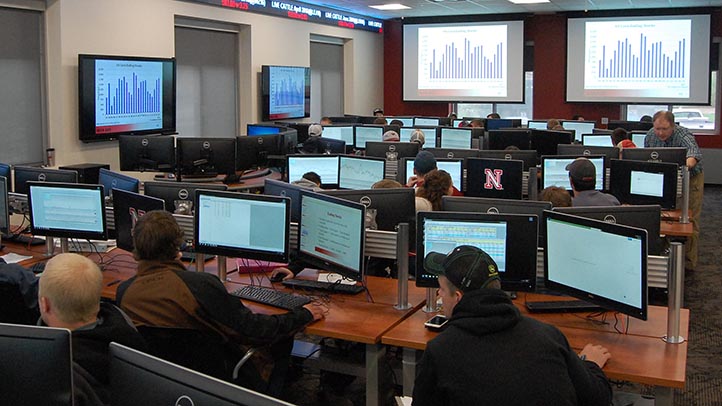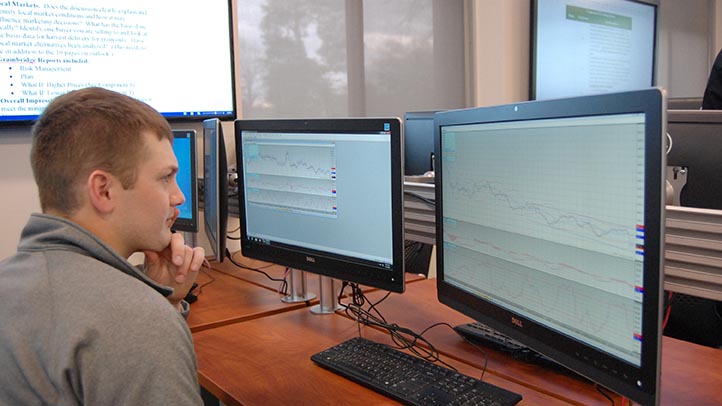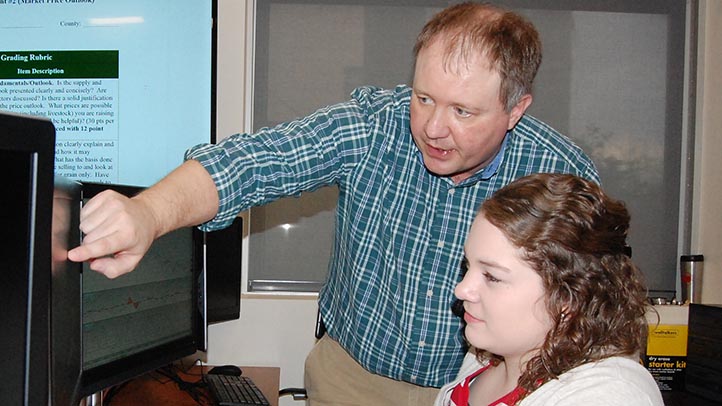With the assistance of generous donors, the Department of Agricultural Economics at the University of Nebraska-Lincoln recently established a commodity trading room that provides students real-time access to commodity markets and advanced training in market, marketing, merchandising, and futures and options markets. Combined with classroom courses, the trading room experience prepares students to be more successful as they enter the competitive job market. The Commodity Trading Room also provides a vehicle for both students and faculty to conduct research in these areas.
Th room features individual computer workstations which are connected in real-time to cash and futures markets, such as grain elevators around the country and the CME Group in Chicago. Workstations allow access to software packages such as Barchart Trader, GrainBridge, and Telvent DTN ProphetX. Students are able to analyze markets, forecast prices, execute trades and evaluate their actions, just as they would in the professional world. The room provides experimental learning opportunities that allow students to apply economic theories learned in the classroom to real-world situations in commodity markets.
Industry input was used to develop and refine a curriculum to utilize the trading room and to ensure students obtain needed skills to succeed in a modern, global economy.
Donors
CHS Foundation
CoBank
Archer Daniels Midland
Cargill
Nebraska Soybean Board
Nebraska Corn Board
Lansing Trade Group, LLC
Scoular Foundation
The Andersons Foundation
Ag Processing, Inc.
Grainbridge
Nebraska Wheat Board
Related Articles
- Thinking about the Corn Market
- Who Is Trading in the Futures Markets and Why It Matters – Part 1
- Who Is Trading in the Futures Markets and Why It Matters – Part 2
- Projecting Corn and Soybean Crops: How Accurate Are Crop Forecasts?
- Commodity Indices and Futures Markets by Fabio Mattos (February 10)
- The Only Thing Constant Is Change: A Brief Overview on How Technology Has Changed Futures Markets Part I
- The Only Thing Constant Is Change: A Brief Overview on How Technology Has Changed Futures Markets Part II
Contact
Associate Professor
402-472-1796
fmattos@unl.edu
Assistant Professor of Practice
402-472-3401
jpeterson13@unl.edu
Commodity Marketing Courses
- AECN 235, Introduction to Commodity Marketing:
This course focuses on the foundations of commodity markets. It discusses how markets were created, how commodities are traded from producers to final consumers, the role of transportation and storage, among other topics. It provides a broad and detailed discussion of economic theories behind markets, how they work in and the current state of these markets in the world.
- AECN 325, Marketing of Agricultural Commodities:
This course focuses on operation and use of agricultural commodity markets and institutions as applied to enterprise and firm risk management. It covers cash, futures and futures option markets, basis, hedging, price discovery, fundamental analysis, and risk management strategies. It is also taught as an online class each summer.
- AECN 336, Grain Merchandising:
This course studies grain merchandising concepts, tools, and strategies as they relate to grain buyers. It helps students understand how grain is traded from the perspective of the grain buyer. AECN 435, Advanced Agricultural Marketing Management: This course in an advanced study of agricultural marketing concepts, tools, and strategies as they relate to risk management for agricultural producers, commodity merchandisers, processors, and other traders. A major objective of this course is to teach students to design marketing plans to meet specific risk management and marketing strategies, including using combinations of derivatives and insurance products.
- AECN 436, Commodity Price Forecasting:
The overall objective of this course is to teach students how to analyze commodity markets using fundamental and technical approaches. The most common techniques from each approach are discussed, focusing on how they can be implemented and their advantages and disadvantages. How these two approaches differ and how they can complement each other in commodity market analysis is also covered.
- AECN 495D, Internship in Commodity Marketing:
The overall objective of this internship is to allow students to gather more exposure to commodity markets and hands-on experience in the field. At a minimum, AECN 235 is recommended before students engage in an internship.



